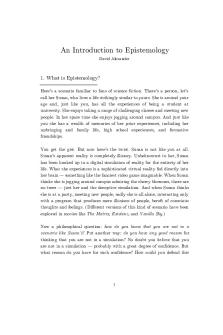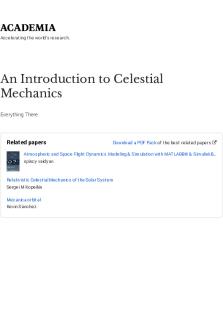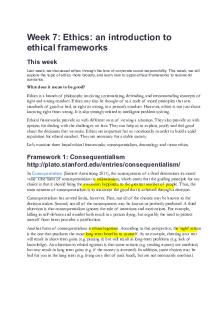COU405 C2 Essay - An Introduction to Ethics in Counselling PDF

| Title | COU405 C2 Essay - An Introduction to Ethics in Counselling |
|---|---|
| Author | Anonymous User |
| Course | An Introduction to Ethics in Counselling |
| Institution | Newman University, Wichita |
| Pages | 6 |
| File Size | 84.9 KB |
| File Type | |
| Total Downloads | 44 |
| Total Views | 149 |
Summary
An Introduction to Ethics in Counselling...
Description
There are many debates on whether personal values should or do influence ethical decisions in counselling settings. A counselling practitioner must be registered by the BACP and abide by the ethics outlined in the BACP Ethical Framework for the Counselling Professions Standards and Ethics. These ethics are based on values, principles and moral qualities. This text will critically discuss a statement made by Bond (2015) ‘A counsellor’s personal values are an important platform upon which to build the ethical basis for counselling, but not an adequate basis for ethical decision making on behalf of clients.’. The author will use principles and concepts outlined in the BACP Ethical Framework for the Counselling Professions Standards and Ethics to discuss this further. Alongside the prior, the author will use literature from a variety of sources outlining the concept of values relating to counselling and ethical challenges that practitioners may face during practice. This text will not only consider ethical factors that practitioners may face but will reflect on the authors own values when developing an ethical basis for counselling practice.
Main 1500 The BACP Ethical Framework for the Counselling Professions Standards and Ethics (2018) state numerous values of Counselling and Psychotherapy, for this text the author will refer to two, Ensuring the integrity of practitioner-client relationships and striving for the fair and adequate provision of services. Values inform principles, the BACP lists numerous principles such as; Understanding the importance of the client trusting the practitioner and acting accordingly: Being trustworthy, Respecting the clients right to be selfdependant: Autonomy, Being dedicated to helping the clients welfare: Beneficence, Ensuring the client is safe and not in way of harm: Non-Maleficence, Ensuring that every client benefits from the same services and that this service is satisfactory: Justice and finally ensuring that they utilise all available services in order to wider their knowledge and ensure that their health is sufficient to practice: Self Respect (BACP, 2018). As practitioners, it is our job to ensure that the above are embedded in our practice with our clients. Bond (2015) states that practitioners values play an important role in the development of ethics in a counselling session, however, it is important to keep these in line with the development of ethical direction when applying in practice. Professional boundaries come into play when looking at Bond (2015) statement, practitioners must establish and understand boundaries prior to practice in aims to protect both the client
and the practitioner from harm. We need to ensure that we identify our limits as service providers; we are not there to save our clients, we are there to guide the client to selfdiscovery, understanding their strengths and what they are capable of (Bachkirova, 2014). In practice, it is not uncommon for therapists to work with a client whereby countertransference occurs. This, in more detail, can be when a therapist has experienced a similar event to what the client is explaining that have or are experiencing. It is important that the practitioner recognises countertransference as if they do not separate their own experiences from the clients this can influence a number of aspects throughout a session Amis (2017). This is an example of poor boundaries as if the therapist does not recognise this and does not separate the experience, this could influence their values and moral qualities of what they think is the best for the client being forefront over what ethically is suitable to help the client (Bachkirova, 2014). This being said, although careful consideration is needed when using moral qualities and values in practice as they can be used in ways deemed unhelpful, Bond (2015) states they are birthed from an individual’s good intentions. Moreover, moral qualities which aspects of self, intentions for good, intentions which can motivate practitioners to strive for the best for their clients. These values can they be solidified through principles, which reflect through actions through the counselling they provide (Bond, 2015). The values, moral qualities and ethics laid out in the framework are not intended to give practitioners solutions to all ethical dilemmas, they are more of a guideline in aims to assist practitioners through these dilemmas (Reeves, 2018). As these guidelines are merely to assist practitioners, it is important to recognise that when practising Counselling and Psychology these ethics can be used, not only to aid practitioners but for the consistent reevaluation of whether the practitioner is meeting the minimum expectations of the framework. However, this ethical framework is designed for members of the BACP, other practitioners may be from other organisations whereby they may have similar, but somewhat different framework guidelines (Reeves, 2018). Scenarios of values not being met vary; however one example may be where a client’s fee for therapy changes without prior notice from the practitioner. This is an example of unintended harm caused. For this example, the integrity of the practitioner-client relationship is not met. This further solidifies the importance of a contractual agreement between the client and the practitioner prior to services being provided. This, undoubtedly, can cause issues between the client and practitioner, which then can affect the principles outlined in the ethical framework. The client may feel the practitioner is no longer trustworthy, or if no
trust has been established, that they could not trust them in the first instance. As noted in Reeves (2014), to further discuss the principle of trust, lack of trust in the practitioner can halt the Principle of Autonomy. This being said, it is not uncommon that a client will overemphasize the practitioner’s abilities. Individuals may turn to therapy for several reasons of emotional distress, this form of distress can enable the feel of helplessness. Therefore, individuals may realise they need support and turn to therapists and occasionally the client may see the practitioner as having ‘magical powers’ in aims to truly fix the issues presented in the session. Thus, this can affect the clients right to be Self-dependant. If the practitioner does not recognise this, the client may rely on the practitioner to ‘fix’ them. In contrast, when the practitioner becomes aware of this reliability and false expectations the client has of them, this enables the client to become more autonomous over the coming sessions (Reeves, 2014). Values, Ethics and the conflicts that a practitioner may face throughout their work are not just specified in the client- practitioner relationship. With reference to Reeves (2018) in this literature, there is a case study outlined whereby conflicts of values and ethics can take place in the organisation itself. Envisage a discussion between colleagues where one discloses information to the other which leaves the one contemplating whether higher authorities or supervisors need to know. The practitioner whom the information has been given to will need to analyse the situations and possible implications this may have. This shows an ethical implication of competency, does this colleague have the capability to continue practice?. This is where the BACP ethical guidelines can assist out of practice as well as in practice (Reeves,2014). Although mainly focused on commitments to clients, this text aims to recognise the commitments inside the practice, between colleagues. Section 24 of the ‘Working to Professional Standards’ in the BACP outlines the commitment to challenge other colleagues in the event of unfair or discriminatory services provided in aims to protect the client/s if necessary (BACP, 2018). It is not uncommon for a practitioner to face conflicting values and principles when deciding what the best route is in order to protect their clients. Ethical decisions consist of detail, detail of whether a moral, legal, ethical or professional issue is at play. This is further detailed in a framework which Davies (2015) proposes. This consists of; what values outlined are in conflict, how can I protect my client, what are the consequences to my decision. The next outlined is whether the situation is actually a
dilemma and if so, what type of dilemma, be that ethical, moral, legal and so on (Davies, 2015). This framework is intended to aid practitioners and help them put situations that they face into context. It can be argued, that by practitioners being able to access a framework for ethical decision making, it enables them to thoroughly assess the situation before making any decisions Amis (2017). Although different, the BACP guidelines similarly aid the practitioners, alongside promoting the use of supervision and training to further assist practitioners. Personal values are at the forefront of ethical practice, the following values; Trust, transparency, courage, reliability, committed, compassionate and patient are such that the author believes they hold which could aid development in ethical practice. Upon reflection of these values, it is understood that, although much evidence states that our values are a result of experiences we have been through, however, they do continue to evolve as the world itself. Through training and supervision values grow, we see new things or even old things which bring us back to our core passion for what we truly believe is important to us and those around us. When embarking on the journey to becoming a practitioner, we will face situations where we will be faced with our values and decisions will need to be made, whether that good or bad. But this, in turn, will help us grow and understand the needs of our clients and the needs for ourselves. Referring back to the earlier text on the principle of self-respect, it is important to ‘check-in’ with ourselves and ensure that we are competent to practice. The values of trust, transparency, courage, reliability, committed, compassionate and patient go hand in hand when practising in this field (Amis, 2017). These values enable clients and co-workers to feel a sense of trust in the relationship, which for clients can be the base of a good client-practitioner relationship. They enable complete transparency and understanding, to limit any pain or harm to the client, this can be assisted further in reference to contractual agreements. They offer empowerment to both the client and the practitioner, the understanding that they can talk to the other openly and honestly, providing the client with the courage to speak out allowing them truly embark on a journey to self-discovery with their therapist. They allow a feeling of reliability, to be able to rely on both co-workers and practitioners to be there and to help you. Finally, they help strengthen the principle of justice, so that all clients are felt they are treated impartially and can access the services they deserve.
In summary, it is understood that values, moral qualities and ethics all go hand in hand when practising in a field such as Counselling Psychology. Values are not stagnant, they are not purely a creation from experiences one has or culture/background they come from, they are built upon throughout a person’s life. In a professional context, there are many values which may be learned through training and supervision, such as competency (Reeves, 2018). The use of values, moral qualities and ethics can be managed with supervision, training, contractual agreements and boundaries set between the client and practitioner.
References Amis, K. (2017). Boundaries, Power and ethical responsibility in counselling and psychotherapy. Sage.
Bachkirova, T. (2014). Role of coaching psychology in defining boundaries between counselling and coaching. In Handbook of coaching psychology (pp. 371-386). Routledge. BACP (British Association for Counselling and Psychotherapy). (2018). Ethical framework for the counselling professions. Bond, T. (2015) Standards and Ethics for Counselling in Action 4th Ed. London: Sage. Davies, N. (2015). Ethical decision making within the counselling professions. Lutterworth: BACP. Dirks, K. T., & Skarlicki, D. P. (2009). The relationship between being perceived as trustworthy by coworkers and individual performance. Journal of Management, 35(1), 136-157. Hough, M. (2014). Counselling Skills and Theory (4th ed.). Reeves, A. (2018). An Introduction to Counselling and Psychotherapy From Theory to Practice (2nd ed.). SAGE Publications inc....
Similar Free PDFs

Introduction to Research Ethics
- 40 Pages

An introduction to Psychology
- 4 Pages

An introduction to sociolinguistics
- 451 Pages

Introduction to Law Essay
- 2 Pages

1. An Introduction to Epistemology
- 10 Pages

1. An Introduction to Glaciers
- 6 Pages

How to write an Introduction
- 3 Pages

An Introduction to English Grammar
- 324 Pages

An Introduction to Celestial Mechanics
- 217 Pages

An Introduction to Linguistics ( PDF)
- 135 Pages
Popular Institutions
- Tinajero National High School - Annex
- Politeknik Caltex Riau
- Yokohama City University
- SGT University
- University of Al-Qadisiyah
- Divine Word College of Vigan
- Techniek College Rotterdam
- Universidade de Santiago
- Universiti Teknologi MARA Cawangan Johor Kampus Pasir Gudang
- Poltekkes Kemenkes Yogyakarta
- Baguio City National High School
- Colegio san marcos
- preparatoria uno
- Centro de Bachillerato Tecnológico Industrial y de Servicios No. 107
- Dalian Maritime University
- Quang Trung Secondary School
- Colegio Tecnológico en Informática
- Corporación Regional de Educación Superior
- Grupo CEDVA
- Dar Al Uloom University
- Centro de Estudios Preuniversitarios de la Universidad Nacional de Ingeniería
- 上智大学
- Aakash International School, Nuna Majara
- San Felipe Neri Catholic School
- Kang Chiao International School - New Taipei City
- Misamis Occidental National High School
- Institución Educativa Escuela Normal Juan Ladrilleros
- Kolehiyo ng Pantukan
- Batanes State College
- Instituto Continental
- Sekolah Menengah Kejuruan Kesehatan Kaltara (Tarakan)
- Colegio de La Inmaculada Concepcion - Cebu





